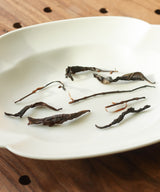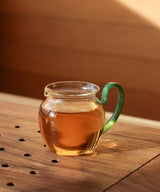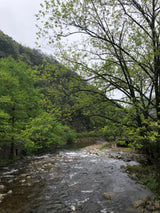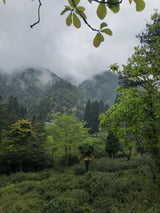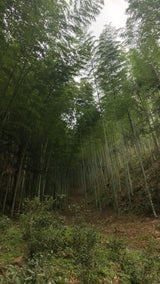2015 Old-Grove Wild Lapsang Souchong Unsmoked
2015年野梗老丛正山小种 非烟熏
Harvest
April 2015
Origin
Tongmuguan, Fujian
A rarely available, seven-years aged, unsmoked Lapsang Souchong from a grove of wild 100-years old tea trees in the historic Tongmuguan County of Fujian Province.
Lapsang Souchong is the direct translation of the tea’s Chinese name: 正山小种. The first two characters 正山 translate loosely into “The mountain” or “the correct/right mountain”, and 小种 translate into “small leaf varietal”. Therefore, Lapsang Souchong essentially means “black tea made from the small-leaf varietal tea trees originating from the mountain of Tongmuguan County”. Lapsang Souchong has two variations: smoked or unsmoked. Usually, in the West, only the smoked variation is available. However the unsmoked variation is more popular with Chinese tea connoisseurs.
Lapsang Souchong is a historic tea - as the world’s first black tea, it is the origin of all black teas. Legend has it that a tea farmer in Tongmuguan was in the process of making green tea, but was interrupted suddenly by intruding troops from the neighbouring village. When the tea farmer came back, the green tea had already oxidized into much darker leaves and had developed an unfamiliar smell. The tea farmer attempted to hide the unfamiliar aroma by smoking the tea leaves over pine wood. At the time, there were many English and Dutch traders in Tongmuguan trading tea, and they immediately fell in love with this new type of tea that was full-bodied, sweet and smoky.
The English loved Lapsang Souchong so much so that a Englishman named Robert Fortune stole 20,000 tea plants from Tongmuguan, and planted the tea trees in Darjeeling, India as Darjeeling is at same latitude as Tongmuguan. This is the beginning of Indian black teas.
Tongmuguan is one of the most beautiful, pristine tea origins we have visited. A protected Nature’s Reserve, it is two hours away from Wuyi Mountain in Fujian Province by car. Only local villagers are allowed entry into Tongmuguan County - a checkpoint is in place at the beginning of the winding road leading into Tongmuguan, and no tourists are allowed inside the County.
This Lapsang Souchong is from Hangdun, the most sought-after village in Tongmuguan County, and one of only 7 villages where authentic Lapsang Souchong originates from. Situated at 4000 ft above sea level, Hangdun is usually surrounded by clouds and fog. The drive up to Hangdun is astonishingly beautiful – a winding road takes you along magnificent cliffs marked with crystalline streams of water, where waterfalls cascade off of every peak.
Century-old wild tea trees grow here, scattered amongst the gigantic bamboo forest. Their branches and trunks are covered with moss, indicating both their age and their vitality. Both stems and leaves were picked from them to make this tea. Similar to what we see in many white teas, these rustic stems make this tea suitable for aging, as the stems have more nutrients and enzymatic compounds in them that preserve the tea and develop character over time.
This is a captivating and delicious black tea. Six-years of age has made it very smooth and settled, and we can better taste its subtleties compared to the stronger, more direct experience of a newer tea. On the palate, it is soft and refined: milky, floral qualities are underlaid with beautiful woody notes. We find hints of Chinese jujube dates, sandalwood, and orchids blended by age to the point where they are almost indiscernible.
. . .
Brewing guide
The key to brewing this tea is to use boiling water, and fast infusions, starting at 10 seconds.
| Tea | 4 g |
| Temperature |
100°C |
| Water | 120 ml |
| Steep time | 10 - 60 sec |
| No. of infusions | 10+ |

